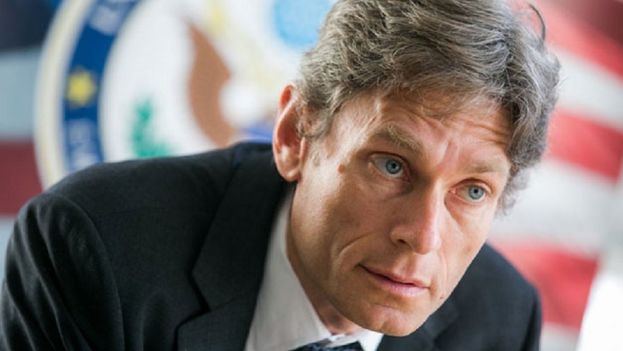
![]() 14ymedio, Miriam Celaya, Havana, 15 October 2016 — The second round of talks on Human Rights took place this past Friday between the governments of Cuba and the United States, as part of the ongoing dialogue initiated when relations were restored.
14ymedio, Miriam Celaya, Havana, 15 October 2016 — The second round of talks on Human Rights took place this past Friday between the governments of Cuba and the United States, as part of the ongoing dialogue initiated when relations were restored.
In line with the importance of the issue and in relation with the relevance that the US government has granted him, this Saturday, Thomas Malinowski — Deputy Secretary of State for Democracy, Human Rights and Labor- who co-chaired the US delegation, together with Mrs. Mari Carmen Aponte, Acting Assistant Secretary for Affairs of the Western Hemisphere — met with independent journalists Ignacio González and Miriam Celaya, to discuss topics that were debated on that occasion.
Unlike the previous meeting held in Washington on March 31, 2015, this time both sides delved deeply into human rights issues, on which they hold opposing positions.
Malinowski: “I don’t expect to be able to persuade the Cuban government about how we consider human rights should be applied in Cuba”
“I don’t expect to be able to persuade the Cuban government about how we consider human rights should be applied in Cuba, but we consider human rights as an important and permanent item on our agenda,” said Malinowski. While acknowledging the opposing stances of the two governments, he considers that these meetings are of great value because, on the one hand, they reflect the common agreement of both governments on addressing that the issue of human rights in the rapprochement process is legitimate; and on the other hand, it has been established that the basis for these freedoms is upheld in international standards that establish the universal character of human rights, recognized and signed by our two countries.
“The result is positive. At least the Cuban government is not refusing to discuss human rights, and does not deny that they are also applicable to Cuba, though the legal interpretation of the principles is defined differently in our countries”.
Both sides discussed related laws and international treaties that confirm the universality and protection of fundamental rights, such as freedom of association, freedom to join unions, and electoral systems, among others. About the last item, the US side fully explained the characteristics of its electoral system and inquired about the Cuban system, particularly the obstacles faced by opponents and critics of the Cuban government to aspire to political office.
“For our part, we recognize that our system is not perfect. But in the US human rights violations are made public, and there are ways and mechanisms to force politicians to fulfill their commitments and obligations”.
Cuban laws, however, are designed so that the Power can manipulate them according to its interests, with no civic or legal mechanisms to force the government to observe the principles enshrined in the Universal Declaration of Human Rights, signed in 1948.
Malinowski asserted that the US government is committed to the debate on human rights at every meeting with the Cuban authorities, but he insists that it is not their place to interfere in Cuban politics, which is a matter for the government and the people of Cuba. He believes that dialogue is proceeding on the basis of mutual respect, despite differences in respective viewpoints on the subject. However, he believes that frank conversations about the realities of our nations create a more positive and beneficial climate for all than does the policy of confrontation that maintained a breach between the two countries.
There are pockets of the dissidence that remain critical or skeptical of the White House’s new policy of a thaw towards the Palace of the Revolution
There are pockets of the dissidence that remain critical or skeptical of the White House’s new policy of a thaw towards the Palace of the Revolution. Some people assume that it only favors the Castro regime, and complain that the demands of opponents are not represented on the agenda.
In that vein, Malinowski said: “We have maintained contact with all of Cuban civil society. Not only with opponents, independent journalists and other sectors of civil society, but also with representatives of the emerging private sector and even the sectors that are in tune with the Cuban government. We want to hear all opinions, aspirations and proposals to form a more complete picture of the aspirations of the Cuban people. We share and defend the defense of human rights and our government will continue with this policy”.
According to Malinowski, a climate of detente favors the desires to strengthen the ties between our peoples, and to promote a mutual approach after half a century of estrangement and hostility. In fact, in the last two years, exchanges between the US and Cuba have increased and diversified, as evidenced –for example — by the participation of young Cubans in scholarship programs in US universities
When asked how the US government viewed Cuban authorities’ insistence on spreading through its media monopoly a distorted interpretation of the topics discussed at the bilateral meetings, Malinowski stated that this encounter with the independent press was exactly a way to get a more complete view to Cubans about information on the issues discussed between the two delegations.
At the end of the meeting, the Deputy Secretary of State for Democracy, Human Rights and Labor recognized the importance of the views and suggestions received by the US delegation from many sectors of Cuban society. “Without their remarks and views, without their participation, our agenda for these meetings on human rights with the Cuban government would not be possible. We appreciate the contributions of all Cubans. We are open to continuing to listen to all proposals, whether they come from those who support the dialogue process or from its detractors”.
Translated by Norma Whiting
